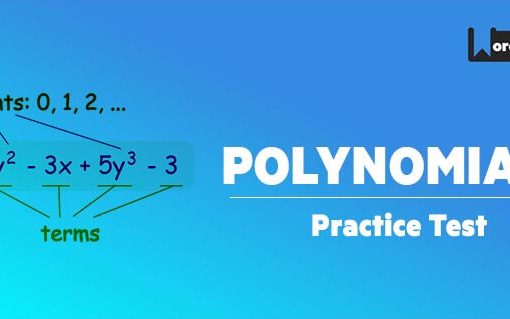- This is an assessment test.
- To draw maximum benefit, study the concepts for the topic concerned.
- Kindly take the tests in this series with a pre-defined schedule.
Algebra: Polynomials Test-4
Congratulations - you have completed Algebra: Polynomials Test-4.You scored %%SCORE%% out of %%TOTAL%%.You correct answer percentage: %%PERCENTAGE%% .Your performance has been rated as %%RATING%%
Your answers are highlighted below.
Question 1 |
$ \displaystyle If\,\,x+y=7,\,\,then\,\,the\,\,value\,\,\,of\,\,{{x}^{3}}+{{y}^{3}}+21xy\,\,\,is$
243 | |
143 | |
343 | |
443 |
Question 1 Explanation:
$ \displaystyle \begin{array}{l}Given,\,\,x+y=7\\Now,\,\,{{x}^{3}}+{{y}^{3}}+21xy\\={{\left( x+y \right)}^{3}}-3xy\left( x+y \right)+21xy\\={{\left( 7 \right)}^{3}}-3xy\,\left( 7 \right)+21xy\\343-21xy+21xy=343\end{array}$
Question 2 |
$ \displaystyle If\,\,\,{{x}^{\frac{1}{3}}}+{{y}^{\frac{1}{3}}}={{z}^{\frac{1}{3}}},\,\,then\,\,\,\left[ {{\left( x+y-z \right)}^{3}}+27xyz \right]$
-1 | |
1 | |
0 | |
27 |
Question 2 Explanation:
$ \displaystyle \begin{array}{l}{{x}^{\frac{1}{3}}}+{{y}^{\frac{1}{3}}}={{z}^{\frac{1}{3}}}\,\,\,\,\,\,\,\,\,\,\,\,\,\,\,\,\,\,\,\,\,\,\,\,\,................\left( i \right)\\Cubing\,\,\,both\,\,\,sides,\,\\{{\left( {{x}^{\frac{1}{3}}}+{{y}^{\frac{1}{3}}} \right)}^{3}}=z\\\Rightarrow x+y+3\,\,\,{{x}^{\frac{1}{3}}}.y{{\,}^{\frac{1}{3}}}\,\,\left( {{x}^{\frac{1}{3}}}+{{y}^{\frac{1}{3}}} \right)=z\\=>x+y-z=3.{{x}^{\frac{1}{3}}}.{{y}^{\frac{1}{3}}}.{{z}^{\frac{1}{3}}}\,\,\,\,\,\,\,\,\,\,\,\,\,\,\,\,\,\,\,\,\,\,\,\,\,\,...............\left( ii \right)\\=>putting\text{ }in\text{ }equation\\{{\left( x+y-z \right)}^{3}}\,\,\,+27xyz=+27\,\,xyz-27xyz=0\end{array}$
Question 3 |
$ \displaystyle If\,\,\,x-\frac{1}{x}=4,\,\,\,then\,\,\left( x+\frac{1}{x} \right)$
$ \displaystyle 5\sqrt{2}$ | |
$ \displaystyle 2\sqrt{5}$ | |
$ \displaystyle 4\sqrt{2}$ | |
$ \displaystyle 4\sqrt{5}$ |
Question 3 Explanation:
$ \begin{array}{l}{{\left( x-\frac{1}{x} \right)}^{2}}=16~~~\\=>{{x}^{2}}+\frac{1}{{{x}^{2}}}=18+2=20\\=>x+\frac{1}{x}=2\sqrt{5}\end{array}$
Question 4 |
$ \displaystyle If\,\,\,x=3+\sqrt{8,\,}\,\,then\,\,the\,\,value\,\,of\,\,\left( {{x}^{2}}+\frac{1}{{{x}^{2}}} \right)$
34 | |
24 | |
38 | |
36 |
Question 4 Explanation:
$ \begin{array}{l}x+\frac{1}{x}=3+\sqrt{8}+\frac{1}{3+\sqrt{8}}=3+\sqrt{8}+\frac{3-\sqrt{8}}{\left( 3+\sqrt{8} \right)\left( 3-\sqrt{8} \right)}=6\\=>{{x}^{2}}+\frac{1}{{{x}^{2}}}={{\left( x+\frac{1}{x} \right)}^{2}}-2\\=>36-2=34\end{array}$
Question 5 |
$ \displaystyle If\,\,\,4{{b}^{2}}+\frac{1}{{{b}^{2}}}=2,\,\,then\,\,\,the\,\,\,value\,\,of\,\,8{{b}^{3}}+\frac{1}{{{b}^{3}}}\,\,is$
0 | |
1 | |
2 | |
5 |
Question 5 Explanation:
$ \displaystyle \begin{array}{l}{{\left( 2b+\frac{1}{b} \right)}^{2}}=4{{b}^{2}}+\frac{1}{{{b}^{2}}}+4=6\\\Rightarrow 2b+\frac{1}{b}=\sqrt{6}\\Therefore\,\,\,\,\,\\=>{{\left( 2b+\frac{1}{b} \right)}^{3}}=8{{b}^{3}}+\frac{1}{{{b}^{3}}}+3\times 2b\times \frac{1}{b}\left( 2b+\frac{1}{b} \right)\\=>\left( 6\sqrt{6} \right)=8{{b}^{3}}+\frac{1}{{{b}^{3}}}+6\sqrt{6}\\=>8{{b}^{3}}+\frac{1}{{{b}^{3}}}=0\end{array}$
Once you are finished, click the button below. Any items you have not completed will be marked incorrect.
There are 5 questions to complete.
List |













